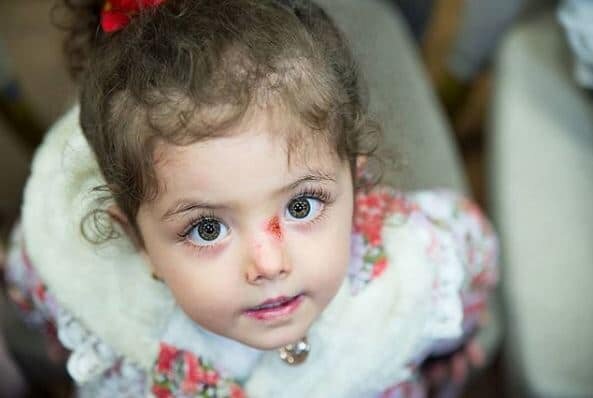EB patients, the most oppressed victims of U.S. sanctions

TEHRAN – Although food and medicine are claimed to be exempted from U.S. sanctions, financial and banking sanctions have limited the life-saving medicine trade which harshly targeted the patients suffering from Epidermolysis Bullosa (EB), a rare genetic disease that causes painful blistering of the skin.
Across the country, 700 people have been diagnosed with EB, but considering that EB is estimated to occur in 1 newborn per 50,000 live births, it is suggested that in Iran 1,200 people are suffering EB.
In Iran, these patients are known as “butterflies” because their skin is as fragile as butterflies' wings, EB patients are in desperate need of special bandages as even minor frictions cause severe painful blisters.
Without the bandages, they face difficulties even in their daily routine, including walking, eating or even breathing, and unfortunately there is no alternative treatment for such pain.
Exemptions for humanitarian trade (such as food, medicine and medical equipment) have not been effective in protecting Iranian patients from access to imported medicine, such as the bandages used for EB patients’ treatment.
Across the country, 700 people have been diagnosed with EB, but considering that EB is estimated to occur in 1 newborn per 50,000 live births, it is suggested that in Iran 1,200 people are suffering EB.Since U.S re-imposed sanctions, a Swedish medical product company (Molnlycke Health Care) refused trade of Mepilex dressings with Iran, fearing American sanctions.
This has resulted in the heartbreaking death of a two-year-old girl named Ava in Ahvaz city.
U.S. ambassador to UN condoles Ava's death
During a United Nations Security Council meeting on December 19, Iran’s Ambassador to UN Majid Takht Ravanchi had spoken about a two-year old girl during his statement to the council.
“To avoid infection, EB children should be covered by special bandages, the alternative is horrible as it peels kids’ soft skin at the time of removal. Nowadays, the importation of these special bandages for EBs has become almost impossible, endangering the lives of innocent children like Ava.
Now butterflies are feeling the pain of the U.S. inhumane sanctions with their hearts and souls. In June this year, Ava was relieved of pain forever and passed away. Her story only reflects the tip of the iceberg, as children and adults with cancer and rare diseases are struggling in silence with death. Killing children and patients takes no courage!” he said in his statement.
After the meeting, U.S. Ambassador to the UN Kelly Craft walked over and expressed her condolences to Takht Ravanchi.
Sanction effects wounded Ava
Ali Rabiei, government spokesman, said that although Ava has been deprived of wound dressing because of the sanctions, she was either wounded by the sanctions which deliberately targeted patients.
They labeled each Iranian citizen as a terrorist, and the international banks have internalized such fear as if they face a terrorist in each ordinary transaction, he lamented.
The lack of a meaningful sanctions strategy is nothing more than a disregard for the citizens’ pain, he added.
Humanitarian goods should not be subject to sanctions
Seyyed Hamid Reza Hashemi Golpaygani, head of EB Health House, has said that “As an advocacy group, we have objected to America’s unilateral ban of medicine and have repeatedly announced that food and medicine should not be on the list of outrageous sanctions.”
Two or three years ago, access to wound dressing was relatively easier for EB patients, but with the return of sanctions, over a year (May 2018-May 2029), 15 patients covered by EB Health House lost their lives like Ava who died of infection and lack of skin care, he lamented.
“We discussed the problem with the Swedish company but they refused to continue trade due to sanctions despite being aware that we are an NGO helping EB patients to survive.”
“If the Europeans and the Americans do not reconsider their decision on humanitarian trade, we will lose more of the EB patients who are often babies and children in dire need of dressing,” he highlighted.
Three days ago, we lost an eight-day-old baby boy in the city of Qom, named Ali Akbar Khorshidi, unfortunately due to the sanctions and lack of medication and dressing, he regretted.
"Our dressing supplies are only meeting the needs of one month of covered patients," he said.
Is there a solution to stop endangering people’s life?
The overboard sanctions are not only harming the Iranians’ economy but also their right to health through limiting access to life-saving medicines.
There obviously are solutions to cut threatening the lives of many oppressed people suffering rare diseases, one of which could be appointing or launching some financial institutions in the country to be allowed to have international transaction for humanitarian or educational purposes.
Or even a third country banking can be designated to conduct similar transactions under supervision and in line with the regulations.
FB/MG
Leave a Comment